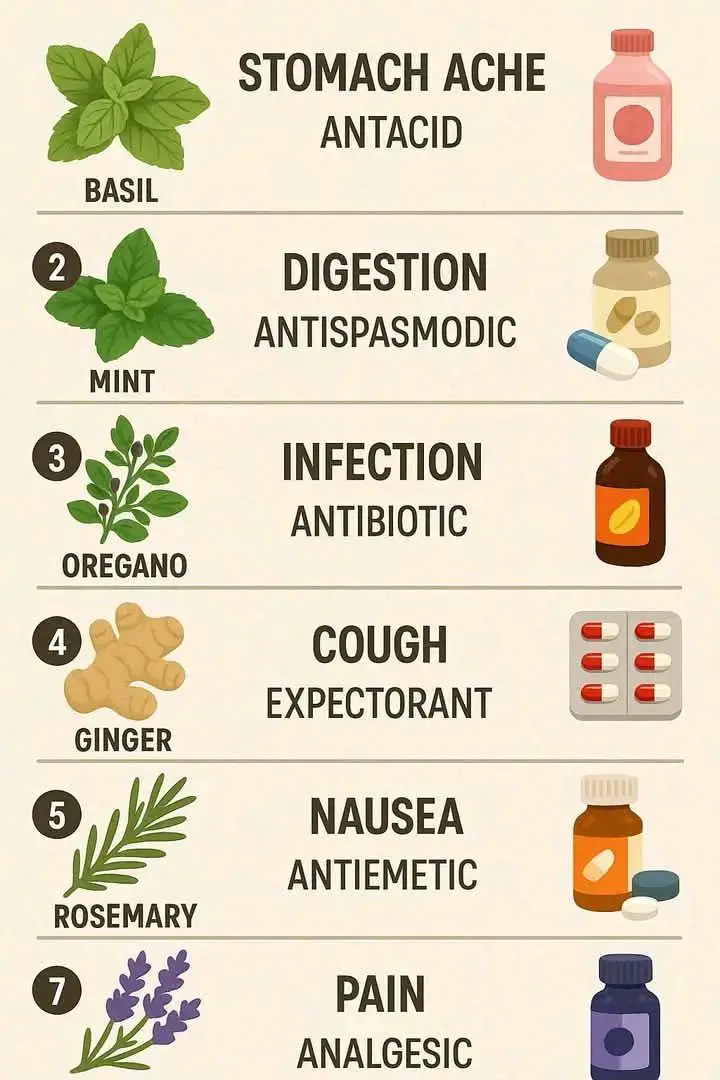Trust Me! Some Herbs Work Magic: 7 Powerful Herbal Remedies for Everyday Health
Herbs have been nature’s medicine chest for centuries, quietly working wonders in kitchens and apothecaries around the world. From soothing an upset stomach to easing inflammation and fighting infections, herbs offer potent, natural relief without the side effects often associated with synthetic drugs. In this post, we’re diving deep into seven amazing herbs—basil, mint, oregano, ginger, rosemary, lavender, and turmeric—and how you can harness their magic in your daily life.
Whether you’re a herbal newbie or a seasoned green thumb, you’ll discover practical ways to use these healing plants to boost your wellness naturally. By the end, you’ll be equipped to create simple, effective herbal remedies right at home, empowering you to take control of your health with the gifts of nature.
Why You’ll Love These Herbal Remedies
What makes these herbs truly special is their remarkable versatility and accessibility. Unlike complex pharmaceuticals, these plants are easy to grow or find fresh and dried at local markets, making natural healing within your reach. The herbs we explore don’t just target symptoms—they help support your body’s natural healing mechanisms.
For example, basil isn’t just a delicious culinary herb—it’s a gentle antacid and stomach soother. Mint isn’t just a breath freshener; it’s an antispasmodic that calms digestive cramps. Ginger not only adds zing to your recipes but also acts as a powerful expectorant for cough relief. These herbs offer multi-dimensional benefits, blending tradition with modern wellness science.
Moreover, these herbal remedies are customizable. Whether you prefer teas, infusions, essential oils, or simply chewing fresh leaves, there’s a method that fits your lifestyle and taste. Their natural origins mean they’re generally safe for most people, and their holistic properties support overall health—not just isolated symptoms.
By incorporating these herbs into your self-care routine, you can reduce reliance on over-the-counter drugs, minimize side effects, and embrace a more sustainable, nourishing approach to health.
Ingredients
Each herbal remedy centers on one key herb, paired with natural, simple supporting ingredients to enhance their effectiveness:
- Basil Remedy
- Fresh basil leaves (5–7 leaves)
- Optional: Warm water or tea base
- Mint Remedy
- Fresh mint leaves (1 handful)
- Hot water for tea
- Optional: Honey or lemon for taste
- Oregano Remedy
- Fresh or dried oregano (1 teaspoon dried or 2 teaspoons fresh)
- Hot water for infusion
- Ginger Remedy
- Fresh ginger root slices (1 inch piece, peeled and sliced)
- Hot water (2 cups)
- Honey (1 tablespoon)
- Lemon juice (from half a lemon)
- Rosemary Remedy
- Fresh rosemary sprigs (1–2 sprigs)
- Hot water for tea or steam
- Lavender Remedy
- Lavender essential oil (a few drops for inhalation or massage)
- Carrier oil (e.g., coconut or almond oil for massage)
- Turmeric Remedy
- Turmeric powder (1 teaspoon)
- Warm milk or plant-based milk (1 cup)
- Optional: Black pepper (a pinch to enhance absorption)
- Honey or sweetener (optional)
Necessary Tools
To prepare and apply these herbal remedies effectively, you’ll need:
- A small saucepan or kettle for boiling water
- A mug or heatproof glass for teas and infusions
- Fine mesh strainer or tea infuser
- Knife and cutting board for fresh herbs and roots
- Mortar and pestle or grinder (optional for crushing dried herbs)
- Essential oil diffuser or inhaler for lavender therapy
- Small bowl or container for mixing oils
- Measuring spoons
These tools make it simple to extract the maximum benefit from your herbs, whether brewing soothing teas or blending healing oils.
Ingredient Swaps and Additions
Herbal remedies can be personalized for taste preferences, availability, or specific health needs:
- Basil: Swap sweet basil with holy basil (tulsi), which has additional adaptogenic benefits.
- Mint: Try peppermint or spearmint varieties depending on your digestive tolerance.
- Oregano: Wild oregano has a stronger antimicrobial effect, but garden oregano works well for culinary infusions.
- Ginger: Substitute with dried ginger powder if fresh isn’t available, but fresh offers more robust flavor.
- Rosemary: Add a few drops of lemon or eucalyptus essential oil to your steam for enhanced nausea relief.
- Lavender: Use dried lavender flowers for tea or sachets if essential oil isn’t accessible.
- Turmeric: Combine turmeric with ginger and cinnamon for a potent anti-inflammatory “golden tea.”
Additionally, you can blend multiple herbs in teas or oils for synergistic effects—for example, mint and ginger for digestive support or turmeric and black pepper for inflammation.
Step-by-Step Instructions
Basil for Stomach Ache and Antacid Relief
- Rinse 5–7 fresh basil leaves thoroughly.
- You can chew the leaves directly to soothe mild stomach discomfort or brew them into a tea by steeping in hot water for 5–7 minutes.
- Sip slowly, preferably before or after meals to reduce acidity and calm your digestive tract.
Mint for Digestion and Antispasmodic Effects
- Pick a handful of fresh mint leaves and rinse gently.
- Pour 1 cup of boiling water over the leaves and steep for 7–10 minutes.
- Optionally add honey or lemon to improve flavor.
- Drink after meals to alleviate bloating, cramps, and indigestion.
Oregano as a Natural Antibiotic
- Use fresh oregano leaves or 1 teaspoon dried oregano.
- Steep in 1 cup of boiling water for 10 minutes.
- Strain and drink the tea once or twice daily during infections to support your immune system.
- Alternatively, incorporate fresh oregano into cooking for ongoing benefits.
Ginger for Cough and Expectorant Relief
- Peel and slice a 1-inch piece of fresh ginger.
- Boil in 2 cups of water for 10 minutes.
- Remove from heat and add honey and lemon juice to taste.
- Sip the warm ginger tea multiple times daily to soothe cough and clear mucus.
Rosemary for Nausea and Motion Sickness
- For tea: Steep 1–2 sprigs of fresh rosemary in hot water for 5 minutes.
- For steam inhalation: Boil water, add rosemary sprigs, then inhale the steam carefully to ease nausea.
- Drink the tea before traveling or during bouts of nausea for relief.
Lavender for Pain and Headache Relief
- Dilute a few drops of lavender essential oil in a carrier oil for massage on temples, neck, or affected muscles.
- Alternatively, add a few drops to an essential oil diffuser and inhale the calming aroma.
- Use regularly to reduce tension headaches and body aches.
Turmeric for Inflammation
- Warm 1 cup of milk or plant-based milk over low heat.
- Stir in 1 teaspoon turmeric powder and a pinch of black pepper.
- Sweeten with honey if desired.
- Drink this golden milk once daily to help combat chronic inflammation.
Pro Tips for Success
- Always use fresh or high-quality dried herbs for maximum potency.
- Steep teas covered to retain essential oils and beneficial compounds.
- For essential oils, never apply undiluted to skin; always dilute with a carrier oil.
- Start with small doses and observe your body’s response before increasing amounts.
- Store herbs in airtight containers away from light and heat to preserve freshness.
- Consult with a healthcare professional if you are pregnant, nursing, or on medications.
Serving Suggestions
- Serve herbal teas hot or iced, garnished with fresh mint leaves or lemon slices.
- Use fresh herbs as garnishes in meals or infused water for subtle flavor and benefits.
- Lavender oil can be added to bathwater for full-body relaxation.
- Turmeric golden milk pairs beautifully with a sprinkle of cinnamon or nutmeg.
- Combine herbal teas with light snacks like nuts, fruit, or whole-grain crackers for a nourishing break.
Storing and Reheating
- Fresh herbs should be stored in the refrigerator wrapped in a damp paper towel inside a sealed container for up to one week.
- Dried herbs last longer when kept in airtight jars away from direct sunlight.
- Prepared teas are best consumed fresh but can be refrigerated for up to 24 hours.
- Reheat teas gently on the stove or microwave; avoid boiling to preserve delicate compounds.
- Essential oils should be stored in dark glass bottles, tightly sealed, and kept cool.
Nutritional Information (Approximate per serving)
- Basil tea: Rich in antioxidants and vitamins A and K.
- Mint tea: Contains menthol, which supports digestion and muscle relaxation.
- Oregano tea: Packed with phenols and flavonoids with antimicrobial effects.
- Ginger tea: Contains gingerols, powerful anti-inflammatory and antioxidant compounds.
- Rosemary tea: Contains rosmarinic acid, helpful for nausea and anti-inflammatory benefits.
- Lavender oil: Aromatic compounds with analgesic and anti-anxiety effects (used topically/inhalation).
- Turmeric golden milk: Provides curcumin, a potent anti-inflammatory antioxidant.
FAQs
1. Can I use dried herbs instead of fresh?
Yes! Dried herbs are more concentrated; use about one-third the amount of fresh herbs in teas and infusions.
2. Are these remedies safe for children?
Most are safe in moderate amounts, but always consult with a pediatrician before using herbs with young children.
3. Can I combine these herbs in one tea?
Yes, many herbs complement each other and can be blended for broader benefits—just ensure flavors are harmonious.
4. How long should I drink herbal teas to see benefits?
Some effects are immediate (e.g., nausea relief), while others require regular use over weeks for chronic conditions.
5. Are there any side effects?
Herbs are generally safe but can cause allergies or interact with medications; always start slowly and seek medical advice if unsure.
Conclusion
Nature’s pharmacy is rich with herbs that offer gentle yet powerful healing for everyday ailments. Basil, mint, oregano, ginger, rosemary, lavender, and turmeric each bring unique properties that can soothe stomach aches, aid digestion, combat infections, relieve coughs, ease nausea, reduce pain, and fight inflammation naturally. By embracing these simple herbal remedies, you step into a tradition of holistic wellness that nourishes body and mind alike.
Try incorporating these herbs into your routine and experience their magic firsthand—your health and well-being will thank you. For those ready to deepen their herbal journey, exploring more recipes and uses can unlock even greater benefits and enjoyment.
Suggested Internal Links
- Herbal Teas to Boost Immunity Naturally
- How to Grow Your Own Medicinal Herb Garden
- Natural Remedies for Digestive Health
- Top Anti-Inflammatory Foods and Drinks
- Essential Oils for Everyday Wellness
Suggested External Links
- National Center for Complementary and Integrative Health: Herbal Medicine — Comprehensive info on common herbs and safety.
- WebMD: Benefits and Risks of Common Herbs — Details on herbs like basil, mint, and oregano.
- Healthline: Turmeric Benefits and Uses — Deep dive into turmeric’s health effects.
- Mayo Clinic: Ginger Uses and Precautions — Guidance on ginger supplementation.
- Medical News Today: Lavender Oil Benefits — Research on lavender for pain and anxiety.







